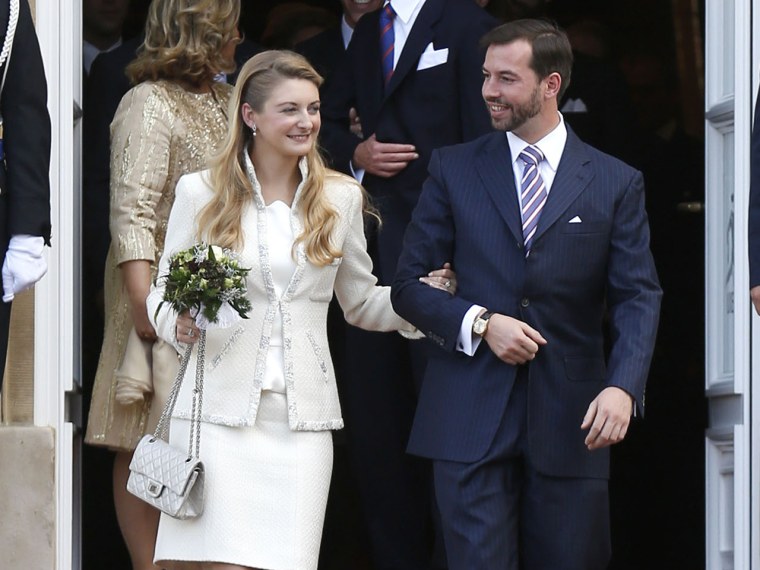The Grand Duchy of Luxembourg doesn't get a lot of turns in the spotlight.
It's an independent country tinier than Rhode Island, the smallest U.S. state, and it would fit inside Germany, its neighbor to the east, 138 times with room to spare. It won no medals at the 2012 London Olympics — in fact it hasn't won a medal at the summer Games since 1952.
But this week is Luxembourg's turn to shine. Prince Guillaume, the heir to the throne — the grand duke-to-be and Europe's last single royal heir — will marry Belgian Countess Stephanie de Lannoy. It will be a two-day affair, including fireworks, concerts, a gala dinner at the grand ducal palace, and two marriages between the betrothed — a civil wedding Friday afternoon and a religious ceremony Saturday morning.
A glittering array of European royalty has been invited. The guest list for the religious ceremony includes kings, queens, princes and princesses from European countries including, among others, Belgium, Norway, Sweden, Lichtenstein, Denmark, the Netherlands, Romania and Britain, which is sending Prince Edward, Queen Elizabeth's youngest child, and his wife, Sophie.
Non-European royalty will be attending, as well, from Morocco, Japan and Jordan and elsewhere.
With all those royals coming to Luxembourg, can international attention be far behind?
"It's good for Luxembourg," said Nadine Chenet, a 46-year-old street cleaner who was picking up cigarette butts with pincers in front of the grand ducal palace. "Many people will come now."
Besides, she just plain likes the royal family, she said: They give a good impression of the country.

That's a sentiment common in Luxembourg. To all appearances, the bride and groom are a lovely couple. He is 30, with dark hair and an immaculate beard. She is 28, blonde and smiling. In public appearances, including at the London Olympics, they have appeared besotted with each other.
According to biographies distributed by the royal court, each has an array of interests befitting those who are to the manner born.
Guillaume speaks four languages, has studied international politics, is a lieutenant colonel in the Luxembourg army (a force of 900 soldiers), and has been engaged in humanitarian work in other countries, including Nepal. The duchess-to-be has studied the influence of German romanticism on Russian romanticism, plays piano and violin, swims, skis, and says she reads three books at a time.
In the language department, she already speaks French and German — two of Luxembourg's three official languages — and, perhaps more importantly, is studying the third, which is called Luxembourgish. She plans to renounce her Belgian citizenship in order to become, eventually, Luxembourg's grand duchess.
Luxembourg is a linguistically complicated country, a reflection of its complicated past. It began as a Roman fortress. It has, at one time or another, fallen under the control of Spain, France and Austria. In 1839, it gained its independence from the Netherlands, but lost more than half its territory to Belgium, which now has a province of the same name. In the 20th century, Germany swept through Luxembourg twice despite its protestations of neutrality.
Luxembourgish is related to German, but it is primarily a spoken language. In the country's schools, elementary students take all their classes in German. When students reach their teens, gradually all classes are converted to French. And English is studied the entire time.

But the language dearest to their hearts is Luxembourgish. As 71-year-old retired engineer Rene Ries — a typical Luxembourger, with a French first name and a German last name — said, Luxembourgish is generally spoken in the home. When there is a complaint, the police file their reports in German. Then the lawyers litigate the case in French.
Asked in which language he felt most comfortable, Ries replied without hesitation that it was Luxembourgish. But he admitted he had trouble writing it. Under duress, he could write his daughter a postcard, he said, but the language is most commonly spoken, not written.
Luxembourg, an important financial center and home to the world's largest steel manufacturer, continues to prosper despite Europe's economic trouble. The country has the second-highest gross domestic product per capita in the world, more than $80,000 — though its population of about 510,000 people is still smarting from having lost the No. 1 spot to Qatar. The capital city has 80,000 inhabitants and 120,000 jobs.
For that reason, more than 43 percent of the people in Luxembourg are foreign nationals, compared to a European Union average of 6.4 percent. When he greets people in the public square, Ries speaks not German, not French, not English, but Luxembourgish. It is not to shame the others. It is to show he is a genuine Luxembourger.
Natives of the Grand Duchy, heavily influenced by Catholicism, are very proper and can be dour.
"When we say, 'It's not too bad,'" Ries said, "we mean it's good."
But above all, they are proud. Proud of their multilingualism. Proud of their grand duchy. And proud of their royal family. The current grand duke, Henri, who is 57, is popular. People can greet him on the street without bowing down before him. His 31-year marriage to Grand Duchess Maria Teresa appears to be very happy. Showcasing the royal family, as the country will do this week, allows Luxembourg to put its best foot forward.
For, as Ries emphasized more than once, the Luxembourgish royals — in contrast to some others — do not sunbathe topless. And for him, that is a source of pride, one he is happy to share with the rest of the world.
"It is a good family," he said.